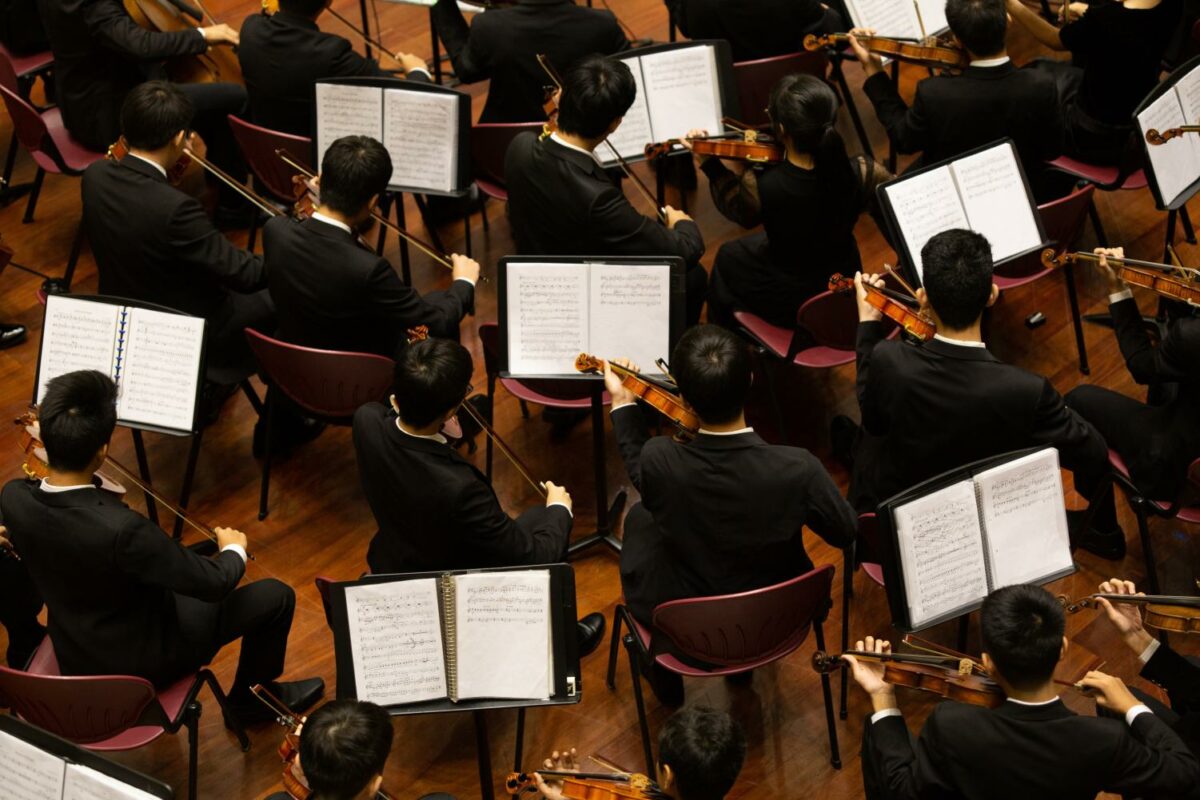
Biola Symphony Orchestra plays Beethoven pieces as well as a composition by interim conductor Elliott Bark.
The orchestra began to trickle onstage, taking their seats, and within moments arose the faint warm-up tunes of the strings, the brasses, the woodwinds and percussionists. It mixed with the murmurs of the audience, a quivering of excitement and anticipation in the air. The lights dimmed. The conductor, Dr. Elliott Bark, interim director of Biola Symphony Orchestra and adjunct professor of composition and conducting, took to the stage — and Beethoven’s music filled the air.
BEETHOVEN AND “REMINISCENCE”
Biola Symphony Orchestra performed three songs: Ludwig van Beethoven’s “Egmont Overture, Op. 84;” “Reminiscence,” by Dr. Bark himself; and “Symphony no. 7” by Beethoven.
“Beethoven’s 7th Symphony is the most joyful and not too tricky,” Bark said. “It is a very exciting and energetic [piece].” For Beethoven’s Overture, he said, “It’s a little bit different from [the] 7th Symphony … it has a lot of political [ideas] going on … it has a bit of a different story.”
With the energetic and fast-paced nature of Beethoven’s songs, Bark wondered how the orchestra would manage. Coming in as an interim conductor, he did not know what to expect. But Bark was very pleased to see how quickly the musicians progressed and could attain the liveliness of Beethoven’s pieces.
“We focused a lot on the tempo,” Bark said. “The tempo we took [is almost] the same as Berlin or New York [Philharmonic] — it’s a very fast tempo, especially the fourth movement.”
Despite the initial challenges in rehearsal, Bark and Biola Symphony Orchestra achieved that spirited tempo performed at that night’s concert.
In addition to performing Beethoven’s dramatically energetic pieces, the orchestra also performed one of Bark’s own compositions titled “Reminiscence.” The gently-stirring and slow-moving song, a contrast to Beethoven’s pieces, was written during Bark’s days of studying composition.
“Everybody was expected to write very complicated music, [and] more intellectual than emotional,” Bark said. “So I was writing something like that … but then I was tired of it.” He talked with his professor, relating his need to write something more emotionally driven. “He said ‘yeah, go for it,’” — and from his heart poured out “Reminiscence.”
The song first premiered at Indiana University (where he attended) and later was performed in Finland, Brazil, Korea and several other locations worldwide.
THE JOY OF MUSIC
Magic flowed in the movements of the conductor. Energetic and spirited, mystical and enigmatic; his gestures pushed, pulled, swayed the music, like a current he could tug and release with supernatural power. A wild and frenzied rhythm lay in his left hand, and in his right he conjured with sweeping motion vigorous surges of power, turning and capturing the flow of music, transforming it to his will.
One of Bark’s greatest joys in his musical journey lies in performing at concerts with Christian musicians.
“An amazing conductor [can] come to New York Phil, and they can make, like, super amazing music, maybe the best music I’ve ever heard,” Bark said. “But will Christ be happy with that? I don’t know, I can’t tell … But then, when I work with the Biola Symphony [and] with the Christian youth orchestras, I can feel [that] God is glorified through it. It doesn’t matter what piece is played, whether it is Tchaikovsky or Beethoven. We’re doing everything for Christ’s glory.”
FUTURE TUNES
In the future, the orchestra plans to play some cheery, festive music for Biola’s Christmas concert in December, and next year they will perform with Biola Theater for the spring musical. Bark also hopes for the Biola Symphony Orchestra to perform some romantic-era pieces for the final concert of the year in April 2023.
The sound of clapping resounded in the auditorium after Biola Symphony Orchestra strung the final note. With a standing ovation, the audience applauded the orchestra and Dr. Elliott Bark, echoes following him as he bowed and exited the stage.